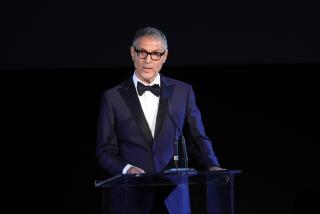Rabin Vows to Boycott Prize Ceremony : Israel: Winner, one of the nation’s sharpest critics, is ready to decline award. Controversy is becoming political crisis for prime minister.
- Share via
JERUSALEM — Israeli Prime Minister Yitzhak Rabin said Sunday that he would boycott the ceremony at which the country’s most prestigious prize is scheduled to be awarded to a 90-year-old biochemist, philosopher and theologian who has become one of the nation’s sharpest critics.
But Yeshayahu Leibowitz said that, in view of the controversy created when he was named recipient of the Israel Prize in honor of his life’s work, he is ready to decline it.
Leaving the government with a new political and moral dilemma over whether it should formally withdraw the award, Leibowitz said he will not accept the prize but is not rejecting it. The problem, he said, is Rabin’s and not his.
“Why should I cause such a complication for the prime minister?” Leibowitz asked. “My honor is not in question.”
The controversy, however, is growing in dimensions to the scale of a political crisis for Rabin, since Leibowitz over the past 40 years has acquired almost prophetic status in a nation where prophets have been rejected initially and then embraced with honor and anguish after they were gone.
“Yeshayahu Leibowitz is a prophet outside the city gates,” declared Shulamit Aloni, the education minister. “He is likely to receive the recognition he deserves only later.”
But Aloni was deserted in her stand by virtually all the other liberals at a Cabinet meeting Sunday, and Rabin had majority support when he declared that he would boycott the Israel Prize ceremony if Leibowitz was honored.
Leibowitz added to the furor over his nomination by comparing the Israeli army’s undercover units--”death squads” to the Palestinians--to Hamas, the militant Islamic Resistance Movement, which carried out a number of successful hit-and-run attacks on Israeli soldiers, police and civilians and then abducted and killed a police sergeant-major last month.
Asked in a radio interview Sunday whether he believes Hamas is made up of “terrorist killers,” Leibowitz said: “Obviously.”
Asked then if he believes that is also true of Israel’s undercover units, as he had implied in comments earlier, he replied: “And so it is with the undercover soldiers.”
Leibowitz, who taught biochemistry and neurophysiology at Hebrew University, began to shock Israelis amid the euphoria of their victory in the 1967 Arab-Israeli War when he warned that military occupation of the West Bank and Gaza Strip and its Arab population could turn Israelis into “Judeo-Nazis.”
“I wrote on the seventh day that this brilliant military victory will prove to be a historical and political disaster for the state of Israel,” Leibowitz said recently of the Six-Day War, when Rabin was chief of staff of the victorious Israeli forces.
An opinion poll in the newspaper Yediot Aharonot over the weekend showed that 54% of those questioned opposed giving Leibowitz the award and 31% were in favor.
Leibowitz’s voice was never one that could go unnoticed. Born in Latvia and educated in Germany and Switzerland, he moved far beyond biochemistry and neurophysiology to become an authority on Jewish philosophy and religion.
An Orthodox Jew who prays daily in his neighborhood synagogue, Leibowitz delights secular audiences with his contempt for Israel’s religious establishment.
But his mark on Israeli society has been made by his unremitting criticism of the Israeli occupation of the West Bank and Gaza Strip. The domination of more than 2 million Palestinians has corrupted Israel, Leibowitz has continued to argue, and has given rise to a “Judeo-Nazi mentality.” Israeli youth thus should refuse to do their military service in the occupied territories, Leibowitz has declared, lest they too become like the Nazi oppressors of the Jews in Europe.
“Our problem is not to liberate the Palestinians. Our problem is to liberate Israel from this curse,” Leibowitz told journalists after his nomination for the Israel Prize.
Many share his views, Leibowitz contended, but “lack the courage to say clearly what they mean--I am their voice.”
More to Read
Sign up for Essential California
The most important California stories and recommendations in your inbox every morning.
You may occasionally receive promotional content from the Los Angeles Times.













